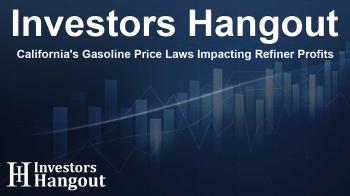California's Gasoline Price Laws Impacting Refiner Profits

California's New Gasoline Price Regulations and Their Impact
Californians are witnessing significant changes in gasoline pricing and the profitability of oil refiners as a result of groundbreaking legislation aimed at holding these companies accountable. After two years since the passage of rigorous laws designed to rein in oil refiner profits and decrease fuel prices, the state is seeing tangible benefits.
The Decline in Gas Prices
Data reveals a continuous decline in gasoline prices within the state, providing much-needed relief to consumers at the pump. This shift came after the implementation of the nation's strictest oil refiner accountability law. The average price per gallon dropped from an alarming $5.40 to $4.64 over the past two years, according to the federal Energy Information Administration (EIA). This decline signifies effective oversight and regulation in a critical sector.
Comparative Analysis with National Prices
The price gap between California's gasoline and the national average has also narrowed, demonstrating the effectiveness of these initiatives. In recent years, the difference shrank significantly, from $1.35 in 2022 to just $1.22 per gallon. By minimizing this gap, residents are benefiting from a more equitable pricing structure.
Monitoring Profit Margins
Another crucial aspect of the legislation is its emphasis on transparency in profit reporting among oil refiners. Through SB 1322, refiners are required to disclose their per-gallon gross refining margins monthly. This requirement has led to a notable decrease in reported profit margins, falling from $1.01 per gallon to 73 cents over a year. Such measures are vital in ensuring that excessive profits are not passed on to consumers.
Effective Measures to Control Pricing
California's Division of Petroleum Oversight was established to regulate the oil industry and enforce compliance with these new laws. This dedicated body is responsible for setting penalties in cases where oil companies excessively profit per gallon—a move aimed at creating a fair marketplace for consumers. Furthermore, plans are in place to finalize rules regarding minimum gasoline inventories and pricing penalties, all intended to ensure a steady supply and reasonable costs.
Long-term Effects and Legislative Support
The implications of these laws extend beyond gasoline prices. They set a precedent for future legislation that addresses climate change and environmental accountability. Proposed initiatives like SB 222, which allows affected parties to claim damages from oil companies responsible for fossil fuel-related disasters, show a growing legislative trend toward holding polluters accountable.
Economist Perspectives on Future Regulations
Experts emphasize that California's rigorous regulations will shield consumers from potential price hikes associated with cleanup costs from environmental damages. These insights, backed by economists and industry advocates, bolster the case for continued oversight of oil refiner actions, resulting in a more sustainable economy.
Community Engagement and Awareness
Community awareness plays a pivotal role in these discussions. Public figures, including actors and activists, have been vocal about the need for responsibility from oil companies in addressing climate issues. Their engagement in pressing for accountability in legislative matters resonates with the public, encouraging a collective push for environmental justice.
Conclusion and Future Outlook
The changes made within California's gasoline pricing laws illustrate the state's commitment to consumer protection and environmental accountability. As regulations evolve and enforcement mechanisms become more robust, the expectation is that prices will stabilize, providing not just immediate relief but also long-term benefits to the community. The dialogue surrounding oil company profits and environmental outcomes remains an ongoing conversation, critical for shaping future legislation.
Frequently Asked Questions
What are the new gasoline price laws in California?
The laws regulate oil refiner profits, requiring transparency in pricing and penalties for excessive profits per gallon.
How have gasoline prices changed since the laws were enacted?
Gasoline prices have seen a steady decline, dropping from $5.40 per gallon to $4.64 over two years.
Who is overseeing compliance with these new gasoline regulations?
The Division of Petroleum Oversight is responsible for enforcing compliance and monitoring industry practices.
What impact do these laws have on climate change accountability?
The laws set a precedent for holding oil companies accountable for their environmental impact and mitigating climate-related damages.
Are consumers protected from increased prices due to cleanup costs?
Yes, experts confirm that current laws are designed to shield consumers from costs related to cleanup of past environmental damages.
About The Author
Contact Owen Jenkins privately here. Or send an email with ATTN: Owen Jenkins as the subject to contact@investorshangout.com.
About Investors Hangout
Investors Hangout is a leading online stock forum for financial discussion and learning, offering a wide range of free tools and resources. It draws in traders of all levels, who exchange market knowledge, investigate trading tactics, and keep an eye on industry developments in real time. Featuring financial articles, stock message boards, quotes, charts, company profiles, and live news updates. Through cooperative learning and a wealth of informational resources, it helps users from novices creating their first portfolios to experts honing their techniques. Join Investors Hangout today: https://investorshangout.com/
The content of this article is based on factual, publicly available information and does not represent legal, financial, or investment advice. Investors Hangout does not offer financial advice, and the author is not a licensed financial advisor. Consult a qualified advisor before making any financial or investment decisions based on this article. This article should not be considered advice to purchase, sell, or hold any securities or other investments. If any of the material provided here is inaccurate, please contact us for corrections.

